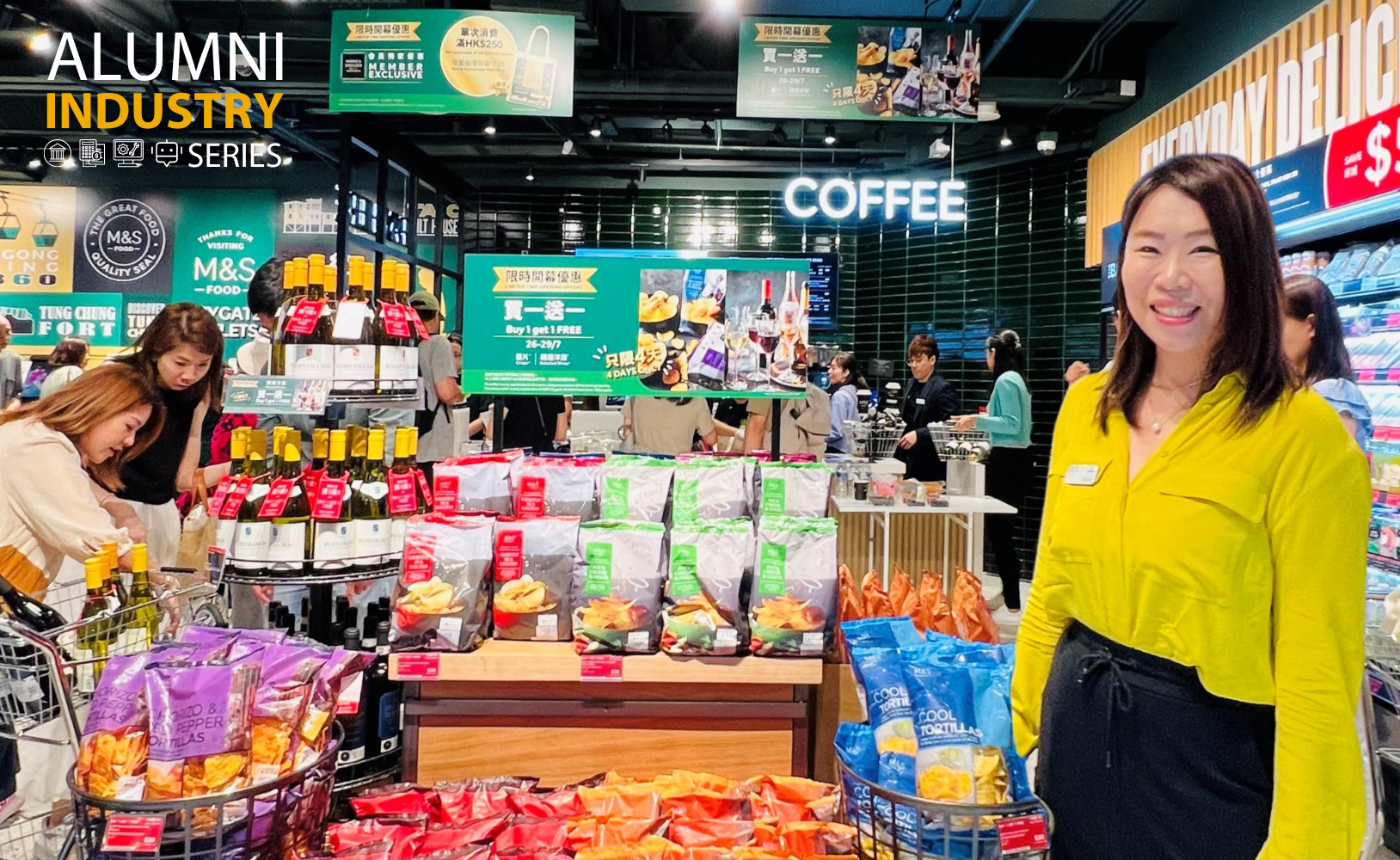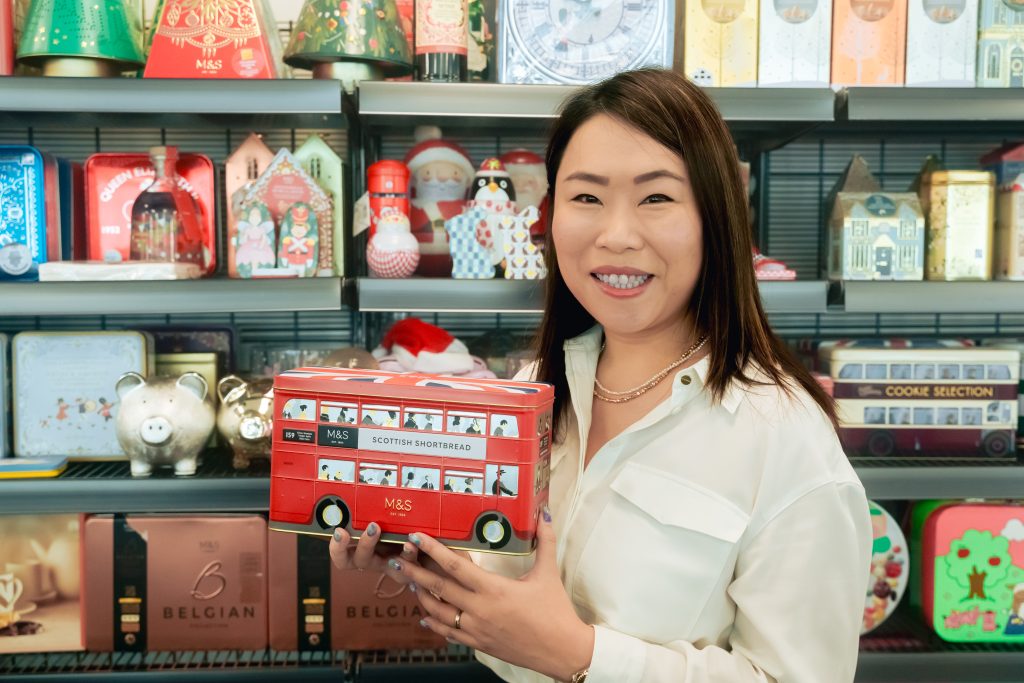Alumni Industry Series|Noel Ng (IBBA 2003) unpacks the nuances of food sourcing

In the realm of supermarkets and department stores, buyers are the unsung heroes whose insights and foresight bring delightful surprises to customers. With over 20 years of experience in procurement, Noel Ng (IBBA 2003), Head of Buying – Food, Hong Kong, Marks & Spencer, describes her role as “incredibly stimulating.” This excitement arises from the immediate feedback on whether products resonate with customers as soon as they are displayed on the shelves. Buyers must cultivate a keen market awareness and prioritise consumer needs over personal preferences, leveraging their expertise to not only fulfil existing demands but also to initiate new trends that can shape the industry. “I am a proud graduate of CUHK!” As the interview commences, Noel reflects on her academic journey and her experience as an exchange student. “I am immensely grateful for the opportunity to study in the IBBA programme, which encompassed courses in management, P&L, marketing, and more. These subjects equipped me with invaluable insights into commercial operations and established a strong foundation for my current career.” Graduating during the SARS outbreak, Noel serendipitously began her career as a purchasing assistant, setting the stage for her journey as a buyer. She explains that this role challenges not only her sense but also her market sensitivity, analytical skills, and adaptability. “You can immediately gauge whether the products you select resonate with customers as soon as they hit the shelves. Our goal is not to persuade customers to buy what we prefer, but to provide them with what they truly want – everything is customer-focused.” With extensive experience across fashion, household goods, and food purchasing, she highlights that the food sector presents the most significant challenges. “This is because every food product has an expiry date, particularly fresh ingredients. If they aren’t sold before that date, they will become food waste!” Product arrangements within the same company can vary significantly too. Factors such as store location, traffic, and customer demographics are crucial considerations for purchasing specialists. For example, Noel explains that customers at MTR station stores are typically in a hurry, leading to a focus on grab-and-go items such as snacks and sandwiches. In contrast, areas such as Central and Tsim Sha Tsui attract a more international clientele, prompting these stores to offer a diverse selection of signature products and cater to special dietary needs, including gluten-free options. Meanwhile, stores in residential neighbourhoods like Tuen Mun and Tsing Yi primarily serve local residents, with bread and biscuits being daily staples for these communities. Over the past decade, Noel has observed a profound transformation in the global food market, with consumers increasingly prioritising health and wellness. “A decade ago, people might have deemed soft drinks unhealthy simply because they are sweet, without truly understanding the underlying issues. Today, customers meticulously compare food labels, scrutinising factors such as product origin, the presence of additives, and levels of sugar and sodium, etc. This knowledge is now ingrained in consumers, so we must stay current and understand the nutritional value and properties of our food products, compelling us to stay informed about the nutritional value and characteristics of our food offerings.” Since the lifting of travel restrictions, many Hong Kong residents have been travelling to mainland China to purchase daily necessities and food. Noel remarks that this shift in consumer behaviour is impacting the entire food industry in Hong Kong, particularly affordable grocery stores, like a tidal wave. To succeed in this evolving landscape, she believes that grocery stores in Hong Kong must carve out their unique identities by importing specialty items, curating high-quality products, and even developing premium private-label brands to attract local consumers. Noel also points to the rise of artificial intelligence (AI) as a transformative force in food sourcing, making the industry increasingly data-driven. “AI can analyse data without the emotional biases that affect human decision-making, which leads to more accurate trend predictions,” she explains. However, when asked about the potential for AI to replace food buyers, Noel remains cautious. “It’s unlikely,” she asserts. “Food buyers often need to create demand — whether by launching new products during festive seasons or setting market trends. These nuanced tasks are challenging for AI to replicate.” Noel underscores the necessity of four essential qualities to join the industry. First is a genuine passion for the work, reflected in a love for exploring new food products and a commitment to the field. Second is a keen sensitivity to numbers; the ability to analyse sales data is crucial for predicting trends. Third, a solid understanding of food nutrition and product knowledge, including storage and transportation methods, is indispensable. Finally, market sensitivity is vital; one must remain aware of changes among competitors and shifts in the market. “For instance, when a fast food restaurant recently launched a maple pancake burger, it quickly became a sensation. My colleagues jumped on the trend by sharing DIY recipes using ingredients available in our stores,” she explains. Noel also encourages her team to engage with customers and staff in-store to proactively understand their needs. “Sometimes, on-the-ground observation can yield unexpected insights.” In Noel’s team, each member must become an expert in a specific type of food, understanding the different characteristics and how to pair them with other foods. Summarising her experience, she recommends the following food pairings to alumni, which are not only delicious but also make people happier: CUHK Business School alumni are everywhere, transcending geographical and industrial boundaries. To explore more inspiring alumni stories, please click HERE.
Customer-focused is the key in food sourcing

Noel notes that the products offered at different stores vary, and adjustments are made based on customer demographics and preferences.The science of stocking goods in different branches

Noel believes that a genuine passion for the work is essential for anyone interested in a career in food sourcing, reflected in a love for exploring new food products.Delicious choices: recommendations for three food pairings

